Customs at the Founding
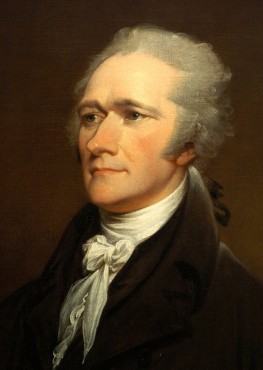
The US Customs Service and, indeed, the United States itself owe their inception to one of our nation’s Founding Fathers and the first Secretary of the Treasury, Alexander Hamilton. During the great debates that led to the dissolution of the Articles of Confederation and the drafting of the United States Constitution, Hamilton was a strong proponent of the creation of a National Bank and the collection of revenue to fund the activities of the federal government.
Throughout many of The Federalist Papers, Hamilton argues that the federal government must collect revenue in order to support its functions. He further argued that lacking support for domestic taxation, duties and tariffs on imports may suffice to fund the government to raise an army and provide for the public good.
Alexander Hamilton thus became the intellectual father of the US Customs Service by laying out not only the argument for federal revenues but also for the constitutionality of revenue collection. As he predicted, federal revenue soon became critical to the United States’ growth, prosperity, and defense.
Revenue for a Young Nation
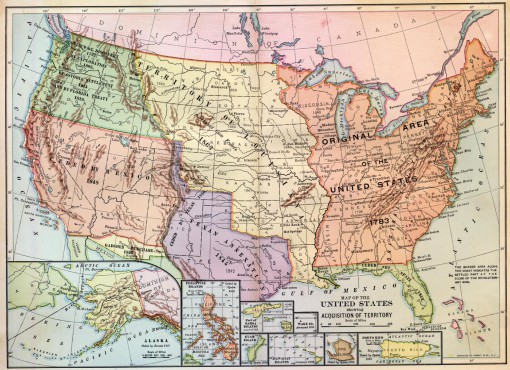
In the early days of the United States, our nation was burdened with large debts from the Revolutionary War and growing expenses related to operating the government. At the same time, because Congress had not yet enacted any domestic taxes, we had no way of collecting much-needed income. Following the advice of Alexander Hamilton, President George Washington and the First Congress created the US Customs Service just four months after ratifying the United States Constitution, on July 31, 1789.
The US Customs Service was created to provide revenue to the new nation through the collection of duties and tariffs on imported goods. For the next 122 years, the revenue collected by Customs represented the vast majority of funds used to support the federal government. Customs Service revenue enabled the US to build Washington DC, construct the Transcontinental Railroad, erect many of the nation’s historic lighthouses, and develop other critical infrastructure still in use today.
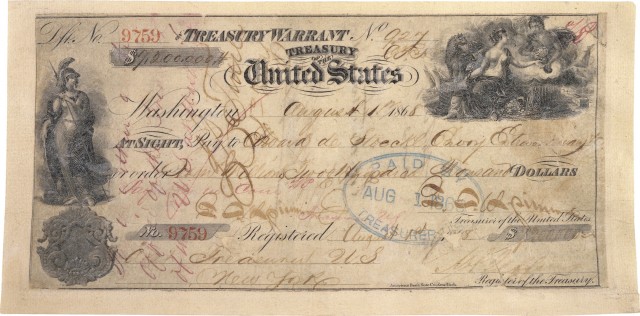
Without this revenue, the young United States would not have been able to expand its territory through land purchases. Tariffs and duties collected by the US Customs Service enabled America to complete the Louisiana Purchase, Alaska Purchase, and numerous other diplomatic arrangements in the 19th century. All told, revenue collected by the US Customs Service enabled the United States to purchase almost 1.5 million square miles of territory — defining the national borders we recognize today.
The Growth of Customs

Since its inception, the US Customs Service has taken on various roles in protecting American citizens and businesses. Because Customs is stationed at our borders, it is ideally located to enforce importation, immigration, and other laws regulating border traffic. With such a broad mandate, it’s not surprising that the US Customs Service quickly became the largest US federal agency — and remained so for much of our nation’s history.When it was established, the US Customs Service was the first and only federal law enforcement agency. As the primary enforcer of federal laws, many other federal agencies owe their inception to Customs. When Congress passed new laws, like discriminatory 19th century immigration restrictions, they did not always create government bodies to enforce those laws. Very frequently, the growth in federal government responsibilities outpaced the growth in federal government agencies. So, as the largest and most sophisticated federal agency, the responsibility to enforce new federal laws often passed to the US Customs Service, as ill-conceived as those responsibilities may have been.
As Customs’ new responsibilities grew and grew, the enforcement of some laws became such a large part of its duties that new agencies had to be formed. The US Customs Service simply became too large and too important, requiring it to split off certain functions into new agencies. Federal agencies such as Immigration, Border Patrol, Coast Guard, Veterans Administration, Public Health Service, and the Drug Enforcement Agency all started out as functions of the US Customs Service. The US Customs Service is truly woven into the very fabric of our nation.
The “Spoils System” and Famous Customs Officers
For almost 100 years after America’s founding, appointments and promotions within the federal government’s Civil Service were made according to the “Spoils System.” Civil Service positions were doled out according to political loyalty and favoritism, enabling well-connected individuals to rise to positions of incredible power based on nothing more than who they knew.
As perhaps the most important agency in the Civil Service, appointments within the US Customs Service operated on this system of favoritism for prominent families and political supporters. Because they were members of high society and powerful families, it comes as no surprise that many of the most famous Customs Officers in our history benefited from this Spoils System. Their political activity and family names gave them an avenue both to celebrity and to powerful positions in the Civil Service, the most coveted of which was often a US Customs Service position.
Nathaniel Hawthorne
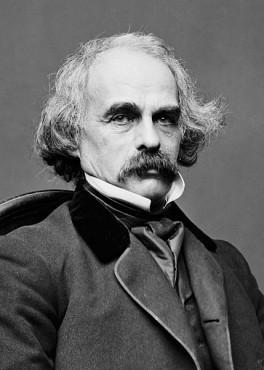
As a member of one of the first Pilgrim families to settle in America and the great-great-grandson of the Judge who oversaw the Salem Witch Trials, Nathaniel Hawthorne was a young man with a leg up in 19th century Boston, Massachusetts. In 1836, he was appointed to the Boston Customhouse as the Weigher and Gauger, a position of modest power but great importance in an era when duties and tariffs were paid based on weight and size. The salary from this employment enabled Hawthorne to write the short stories “Young Goodman Brown” and “The Minister’s Black Veil,” which were published in various magazines of the time.
As a prominent Democrat, Hawthorne was promoted to the US Customs position of Surveyor for the District of Salem and Beverly and Inspector of the Revenue for the Port of Salem in 1846, during the administration of Democratic President James Polk. However, with the election of the Whig Party’s candidate Zachary Taylor in 1848, Hawthorne lost his Customs appointment and spoke out harshly against the Spoils System in a letter to the Boston Daily Advertiser.
Despite his protestations, Hawthorne would profit once more from the Spoils System after his friend and subject of a flattering campaign biography, Franklin Pierce, won the Presidency in 1852. In return for casting a positive light in The Life of Franklin Pierce, Hawthorne was appointed to the position of United States consul in Liverpool in 1853, the most lucrative foreign service position at the time. However, at the end of the Pierce Administration in 1857, Hawthorne once again lost his Civil Service position, this time in a quieter manner.
Herman Melville

Largely unappreciated as a serious writer during his lifetime, Herman Melville spent his later years as a Customs Inspector at the New York Customhouse, from 1866 until 1886. After Moby Dick and a collection of poems failed to garner broad critical attention, he was able to obtain the Customs position through the political influence of his wife’s family.
The stability of this position enabled Melville to recover from his alcoholic depression and write volumes of poetry, which brought him solace but no income. It would be 24 years after his death before his world-renowned works of poetry and epic fiction gained the popularity and acclaim they deserved. But without his Customs positions, Melville may never have had the financial stability needed to focus on his writing.
President Ulysses S. Grant
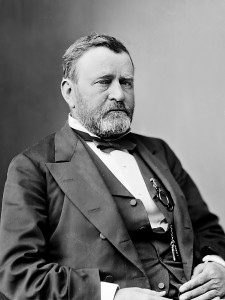
After graduating from the US Military Academy in 1843, Ulysses S. Grant served in the Mexican-American War until he resigned his military commission in 1854. From neither wealth nor prominence, Grant was only able to secure a Clerk position in the St. Louis Customhouse for one month before the Collector died and was replaced along with Grant. He then worked as a Clerk in his father’s leather goods store until he volunteered with the Illinois Militia at the start of the Civil War in 1861 — the beginning of his rise to War Hero status that culminated in his election as President in 1868.
While his stint in the US Customs Service was brief and uneventful, Grant’s Presidency was rife with corruption scandals within the Civil Service that eventually led to its reform. In 1871, the New York Customhouse oversaw the busiest port in America, collecting more duty and tariff revenue than any other Customhouse in the country. Seeing an opportunity for profit, several of Grant’s Spoils System appointees set up a scheme in which private merchants — themselves friends of Grant’s — leased warehouse space to the Customs Service at exorbitant rates, with the private profits finding their way back into the Collectors’ and federal secretaries’ pockets.
When the outrage at this scandal grew too great and President Grant needed a new Collector of Customs for the Port of New York, he turned to a political ally, fundraiser, and member of the New York Republican Party machine: Chester A. Arthur. At the time of his appointment, Arthur was little known outside of Tammany Hall’s political circles, yet his new position at the Customhouse afforded him great power and profit.
President Chester A. Arthur

As Collector of Customs at the Port of New York, Chester A. Arthur accumulated enormous political influence from a position that gave him wide powers over trade and commerce in the booming metropolis. As Collector of Customs, Arthur was paid a percentage of the duties, tariffs, and fines he levied on merchants — in addition to his annual salary — adding up to as much as $50,000 per year, more than even the President’s salary at the time. With greater than 1,000 positions appointed directly by Arthur, he quickly became known as a mighty power broker within the New York Republican Party, giving him enough sway with a formidable voting bloc to secure his nomination as Vice President when James A. Garfield ran for President in 1880.
After President Garfield was assassinated by a political supporter who was unable to secure a prominent political appointment through the Spoils System, public pressure mounted on the new President Arthur to reform the Civil Service. Despite having benefited handsomely from the Spoils System himself as the Collector of Customs, President Arthur shocked onlookers by signing the Pendleton Civil Service Reform Act in 1883, creating the merit-based system of promotion in the Civil Service which we continue to employ today. This Act enabled the US Customs Service to modernize its hiring practices, adapt throughout the 20th century, and perform its responsibilities to the highest standards.
Customs and Prohibition

Carrie Nation was a forceful proponent of the Temperance Movement, with a reputation for smashing saloons with her infamous hatchet.
When the “Noble Experiment” of alcohol prohibition went into effect on January 1, 1920, with the enactment of the 18th Amendment and the Volstead Act, the production, sale, and importation of alcoholic beverages became illegal in the United States. While the Prohibition Unit within the Bureau of Internal Revenue was responsible for enforcing the federal ban on domestic production and sale of alcohol, the task of seizing alcohol imported from abroad fell to the US Customs Service.
With booze outlawed, its allure only seemed to grow more powerful. Americans’ insatiable thirst created demand for alcohol that far outstripped the capacity of domestic bootleggers to quench, so many enterprising individuals turned to “rum-running” to supply the alcohol that America demanded.
US Customs Agents had already been tasked with intercepting alcohol smugglers that sought to skirt the duties and tariffs owed on legal imports. With the introduction of Prohibition, Customs Agents simply shifted from regulating alcohol imports to preventing all imports of intoxicating beverages. However, despite this relatively technical change in responsibilities, the 13 years of Prohibition proved to be the deadliest and most hazardous time for Customs Agents. Their quarry was no longer unscrupulous merchants, but out-and-out criminal enterprises bent on illegal profits.
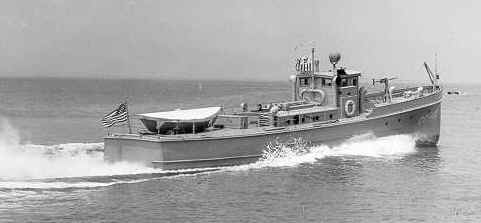 Whether patrolling land or sea borders, Customs Agents were faced with chasing and capturing rum-runners with vastly superior equipment and enormous budgets. Many people know that alcohol smuggling during prohibition gave rise to the Hot Rod automobile, souped up to outrun federal agents. But rum-running off of America’s coasts was also the impetus for the growth of the modern speedboat. Alcohol was produced in the Caribbean and shipped on large “mother ships” up the east coast, where they would anchor just outside the United States’ 3-mile jurisdiction line. Then small, light, fast speedboats would transport the booze to shore — too quickly for the large US Customs Service boats of the time. In 1924, the US Customs Service launched its first speedboat to intercept these operations, known as the CG-403 or “The 400 Boats” (pictured above-left).
Whether patrolling land or sea borders, Customs Agents were faced with chasing and capturing rum-runners with vastly superior equipment and enormous budgets. Many people know that alcohol smuggling during prohibition gave rise to the Hot Rod automobile, souped up to outrun federal agents. But rum-running off of America’s coasts was also the impetus for the growth of the modern speedboat. Alcohol was produced in the Caribbean and shipped on large “mother ships” up the east coast, where they would anchor just outside the United States’ 3-mile jurisdiction line. Then small, light, fast speedboats would transport the booze to shore — too quickly for the large US Customs Service boats of the time. In 1924, the US Customs Service launched its first speedboat to intercept these operations, known as the CG-403 or “The 400 Boats” (pictured above-left).
Customs Today
Today, the responsibilities of Customs include examination of people, products, animals, and agriculture entering the United States to ensure adherence to immigration, intellectual property, environmental, and consumer protection laws. Customs protects the competitiveness of our workers, the integrity of our businesses, the health of our environment, and the safety of our citizens. Each year, Customs Officers collect more than $32 billion in duties, tariffs, and fines — revenue that Alexander Hamilton envisioned supporting our federal government.
In 2003 the US Customs Service was merged into several other related federal agencies to create Customs and Border Protection and placed in the Department of Homeland Security. This merger threatened to eclipse the storied history of Customs as Homeland Security sought to establish its own culture and history. The National US Customs Museum Foundation was founded to preserve the important history of the US Customs Service by telling its story to a new generation of Americans.
